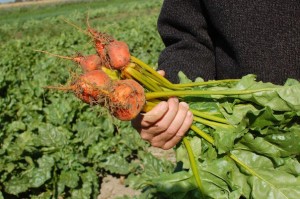
 The problem of contamination by genetically engineered (GE) seeds and crops received a lot of attention in 2010 thanks to court decisions involving GE alfalfa and sugar beets. OSA has been on the frontline as a plaintiff in two sugar beet lawsuits against the U.S. Department of Agriculture (USDA). We call ourselves a reluctant plaintiff, as we neither have a history of engaging in lawsuits nor operate as an “anti-GMO watchdog.” More than anything we are a research and education organization.
The problem of contamination by genetically engineered (GE) seeds and crops received a lot of attention in 2010 thanks to court decisions involving GE alfalfa and sugar beets. OSA has been on the frontline as a plaintiff in two sugar beet lawsuits against the U.S. Department of Agriculture (USDA). We call ourselves a reluctant plaintiff, as we neither have a history of engaging in lawsuits nor operate as an “anti-GMO watchdog.” More than anything we are a research and education organization.
Update on Sugar Beet Lawsuits
First, an update: OSA, represented by the Center for Food Safety, enjoyed a huge victory in August when a federal district judge for the Northern District of California, Jeffrey White, vacated USDA’s approval of Roundup Ready (RR) sugar beets pending a full Environmental Impact Statement (EIS). This means RR sugar beets are again a regulated crop and illegal to plant commercially.
Within weeks of this ruling, however, USDA issued permits for GE sugar beet plantings intended for future seed production. In response to these permits, OSA joined a second lawsuit in September challenging these plantings, and in November, Judge White ordered the crops be destroyed. He wrote, “the legality of Defendants’ conduct does even appear to be a close question. It appears clear that Defendants and Intervernor-Defendants were merely seeking to avoid the impact of the Court’s prior order [in the first sugar beet case].”
Why Did OSA Get Involved?
OSA engaged in these lawsuits for a number of reasons. For starters, current regulatory frameworks do not protect organic and non-GE farmers, plant breeders, and other stakeholders from GE contamination. The framework for GE crops does not even attempt to contain and segregate commercialized GE crops from non-GE crops, and instead unfairly places the burden of protecting the integrity of organic seeds and other agricultural products on the shoulders of organic farmers. Up until these cases, no EIS had ever been conducted on a GE food crop. That means potential agronomic, economic, and environmental effects of GE seed never received in-depth analysis before moving onto shelves and into fields.
In the event contamination occurs, farmers have no recourse to recoup damages because the question of who is liable has not been determined. They are left with the economic and agronomic costs of detecting and eradicating GE material; losing the genetic integrity of seed on which they rely; taking measures to avoid future contamination; and selling contaminated products into the conventional market, losing a premium for organically produced products.
Farmers and farm groups, including OSA, with seeds and crops threatened by USDA’s approval of GE sugar beets therefore turned to the courts for action. OSA’s participatory plant breeding work focuses on improving several vegetable crops for organic systems. Many of these crops, especially beets and chard, are affected by the release and widespread use of GE sugar beets. This poses significant risk to the genetic integrity of the seed we develop and the markets for which they are produced, since our partners’ customers expect products to be free of GE traits.
Our research and education projects strive to create economic opportunities for farmers through participation in regional seed production and marketing systems that add value to their farm. Current and future opportunities in organic seed are lost when the integrity and value of plant genetics on which organic farmers and plant breeders rely are compromised. The reality is simple: When farmers lose the genetic purity of their seed, they lose their freedom to operate free of GE contamination.
Consumers of organic also demand seed and food ingredients be free of GE traits. In absence of GE ingredient labeling, consumers continue to rely on organic products as alternatives to products that contain GE ingredients. They reasonably assume organic products do not contain GE material. In fact, in the 2007 decision to require a full EIS on RR alfalfa, Federal District Court Judge Charles Breyer wrote that to “farmers and consumers organic means not genetically engineered, even if the farmer did not intend for his crop to be so engineered.” Judge Breyer understood well that contamination of organic products by GE traits removes choice from organic farmers and consumers alike, and that farmers and consumers have the right to produce and consume food that is GE-free.
The presence of GE traits in organic seed and products therefore harms the integrity of organic and causes customers to lose confidence in this valuable label. No food production standard is stronger than the National Organic Program, yet GE crops pose the biggest risk to the credibility of the organic seal. Still, USDA minimizes the threat of contamination and ensuing consequences, be it loss of market or genetic integrity of seed stock.
GE Sugar Beets Easily Cross-pollinate with Non-GE Relatives
The species at issue (Beta vulgaris) is one of the few vegetable crop species that is wind pollinated. Some insect pollination occurs in beets, but wind accounts for most pollination events. Furthermore, beets are self-incompatible, meaning each plant must have pollen from a genetically different individual to produce viable seed. Table beets and chard have large numbers of flowers per plant and produce large amounts of pollen. Crops within the Beta vulgaris species are fully sexually compatible and mating between any two of these crops will occur if they flower in proximity to one another, as pollen from one will readily fertilize any of the other’s flowers, resulting in viable offspring that produce viable seed. Research shows that beet pollen can travel for miles. There’s no realistic distance that completely isolates two cross-pollinating crops 100 percent of the time, especially in a highly concentrated seed production location like the Willamette Valley, where OSA has ongoing breeding projects with farmers.
Maintaining the genetic purity and proper isolation distances with these crops is difficult as it is without introducing a novel, engineered trait that is outright rejected by various markets. Cross-pollination between a GE crop and a non-GE crop of the same species causes a number of problems. Contaminated seed will not be acceptable for many farmers’ use because 1) contaminated seed cannot be sold into countries that do not allow GE crops or products, regardless of how it was grown, and 2) contaminated seed will not comply with USDA standards for organic certification, which does not permit GE content in organic seed. It cannot be sold as organically certified seed in the U.S. or into any international organic seed market that adheres to the standards established by the International Foundation of Organic Agricultural Movements.
Contamination is particularly a concern for the seed crops mentioned above (table beets and chard) because they are relatives to sugar beets and grown in the same region. Washington and Oregon account for over 80 percent of U.S. chard and table beet seed production, and 50 percent of world chard and table seed production. These crops are valued at millions of dollars. It’s not just organic markets that will reject seed with GE contamination. This valley is home to a high value specialty seed trade with buyers in the Pacific Rim and European Union who will also reject contaminated seed.
Once contamination occurs, farmers can neither detect the presence of a transgenic trait without testing, nor can they remove the foreign DNA sequence from the crop. If contaminated seed is planted unknowingly, contamination will spread.
The State of the Conventional Sugar Beet Seed Supply
Part of the sugar beet debate has focused on the lack of conventional seed available, a seed supply that is uncertain only because the biotechnology firms controlling the supply keeps this information hidden. If there is not enough conventional sugar beet seed available, this is the fault of seed companies that put profit before farmer choice. Indeed, in the recent case that concluded with a judicial order to destroy Roundup Ready sugar beet stecklings grown under USDA permit, Federal District Court Judge Jeffrey S. White “expressed particular irritation that USDA, Monsanto and its beet partners had not better prepared for the beets’ return to regulated status. They waited almost a year after his first ruling before seeking to enact interim measures, a delay that exacerbated the harm that could result from the beets’ destruction.” We would hope that USDA (and the U.S. Department of Justice for that matter) explore the reasons behind a conventional sugar beet seed shortage (be it real or perceived) and question the role of market power in the seed options available to farmers.
Moving Forward
These legal victories establish important precedents in court and call on regulatory agencies to honor organic integrity. The threat of contamination to organic seed and crops is real, and risks compromising livelihoods, genetic integrity, and faith in the organic label.
But courts are not a policy solution.
For one, USDA needs to adopt recommendations by its own Inspector General and the Government Accountability Office regarding the agency’s oversight of GE crop field trials. The agency also needs to comprehensively examine the pervasiveness of contamination in non-GE seed. And, as an organic community, we must keep pressure on Congress to pass a federal Farmer Protection Act that transfers liability for unwanted GE material and economic damage in contamination cases to the patent holder or manufacturer of GE seeds.
We must also continue to engage in the public comment process. This month, OSA submitted comments regarding USDA’s draft Environmental Assessment (EA) seeking partial deregulation of RR sugar beets. The EA dismisses the adverse agronomic and economic effects that contamination by RR sugar beets will have on organic and other non-GE seeds and crops. The proposal essentially provides a means to temporarily commercialize GE sugar beets while the EIS is being written through the unprecedented use of permits, which have only been used for experimental field trials.
As for OSA’s contribution, we continue to support the ethical development and stewardship of seed by convening discussion on important issues like organic integrity and the proper management of seed as a natural resource. Even more importantly, we continue to expand and preserve seed as a natural resource through the opportunities we’re establishing for farmers, universities, and other partners in the form of regional seed production models.
We hope you’ll join us.
